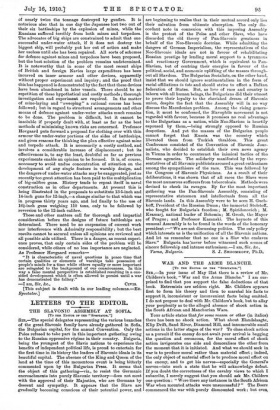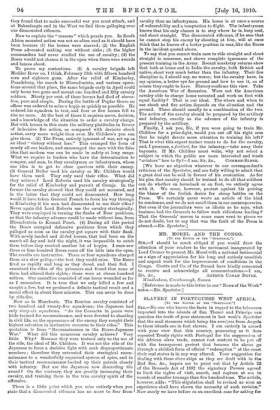WAR AND THE ARME BLANCHE. [To TUE EDITOR OF THE
"SFECTITOR."1 Sis ,--In your issue of May 21st there is a review of Mr. Childers's book, " War and the Arme Blanche." I am sur- prised to find that you support the false deductions of that book. Extremists are seldom right. Mr. Childers appears first to form his theory and then to marshal his facts to support it, inconsistent or inconvenient facts being omitted. I do not propose to deal with Mr. Childers's book, but to allay your perplexity as to the alleged absence of shock action in the South African and Manchurian Wars.
Your article states that for some reason or other (in italics) there has been no shock action. What about Elandslaagte, Blip Drift, Sand River, Diamond Hill, and innumerable small actions in the latter stages of the war P To class shock action as a pursuit if the enemy do not await your arrival is begging the question and erroneous, for the moral effect of shock action invigorates one side and demoralises the other from the moment that it is initiated. And what we should seek in war is to produce moral rather than material effect ; indeed, the only object of material effect is to produce moral effect on the enemy, and to get his nerves—especially the General's nerves—into such a state that he will acknowledge defeat. If you doubt the correctness of the cavalry views to which I subscribe, I merely suggest that you should ask Mr. Childers one question : " Were there any instances in the South African War when mounted attacks were unsuccessful ? " The Boers commenced the war with purely dismounted work ; but even,
they found that to make successful war you must attack, and at Bakenlaagte and in the West we find them galloping over our dismounted riflemen.
Now to explain the " reasons " which puzzle you. In South Africa mounted action was not so often used as it should have been because (1) the horses were starved ; (2) the English Press advocated making war without risks ; (3) the higher commanders had never studied the use of cavalry ; (4) the Boers would not chance it in the open when there were swords and lances about.
To prove my contentions. (1) A cavalry brigade left Modder River on, I think, February 13th with fifteen hundred men and eighteen guns. After the relief of Kimberley, Paardeberg, the march to Bloemfontein, and various opera- tions around that place, the same brigade early in April could only horse two guns and mount one hundred and fifty cavalry soldiers. Ninety per cent. of these horses had died of starva- tion, pure and simple. During the battle of Poplar Grove an officer was ordered to seize a kopje as quickly as possible. He ordered his squadron to trot, and four or five horses fell to rise no more. At the best of times it requires nerve, decision, and a knowledge of the situation to order a cavalry charge. But with horses in this state the military platitudes in favour of indecisive fire action, as compared with decisive shock action, carry more weight than even Mr. Childers's pen can give them. (2) The Press, entirely ignorant of war, set up as an ideal "victory without loss." This cramped the form of nearly all our leaders, and encouraged the men with the false idea that modern war can be made in safety at long range. What we require is leaders who have the determination to conquer, and men, be they cavalrymen or infantrymen, whose one idea is to get to close quarters with their enemy. (3) General Buller used his cavalry as Mr. Childers would have them used. They only used their rifles. What did they achieve ? Lord Roberts used his cavalry strategically for the relief of Kimberley and pursuit of Cronje. In the former the cavalry showed that they could act mounted, and in the latter that they could act dismounted. How long would it have taken General French to force his way through to Kimberley if his men had dismounted to use their rifles P Never again did Lord Roberts use the cavalry strategically. They were employed in turning the flanks of Boer positions, so that the infantry advance could be made without loss, from Bloemfontein to Komati Poort. (4) During all this period the Boers occupied defensive positions from which they galloped as soon as the cavalry got square with their flank. With newly landed and ill-fed horses, that had been on the march all day and half the night, it was impossible to catch them before they reached another lot of kopjes. I once saw three or four hundred Boers come off the hills into the open. The results are instructive. Three or four squadrons charged them at a slow gallop,—the best they could raise. The Boers fired as rapidly and long as they dared, and then fled. I examined the rifles of the prisoners and found that none of them had altered their sights ; these were at eleven hundred metres. Our casualties consisted of one horse wounded as far as I remember. It is true that we only killed a few and caught a few, but we produced a definite tactical result and a moral effect in about three minutes. This can never be done by rifle-fire.
Now as to Manchuria. The Russian cavalry consisted of two hundred and twenty-five squadrons; the Japanese had only sixty-six squadrons. "As the Cossacks in peace were little trained for reconnaissance, and were devoted to shooting in civil life, on the appearance of the enemy they sought their highest salvation in instinctive recourse to their rifles." This quotation is from " Reconnaissance in the Russo-Japanese War." What did this numerous cavalry achieve ? Very little. Why ? Because they were trained only to the use of the rifle, the ideal of Mr. Childers. It was not the ride of the Japanese to force a decisive fight with such disproportionate numbers ; therefore they entrusted their strategical recon- naissance to a wonderfully organised system of spies, and in their tactical reconnaissance backed up their patrols closely with infantry. But are the Japanese now discarding the sword ? On the contrary, they are greatly increasing their cavalry, and training them in the true cavalry spirit of the offensive.
There is a little point which you miss entirely when you state that a dismounted rifleman has no more to fear from cavahy than an infantryman. His horse is at once a source of vulnerability and a temptation to flight. The infantryman knows that his only chance is to stay where he is, keep cool, and shoot straight. The dismounted rifleman, if he sees that he cannot stop his enemy by shooting at him, will at once think that he knows of a better position in rear, like the Boers in the incident quoted above.
To say that you cannot train men to ride straight and shoot straight is nonsense, and shows complete ignorance of the present training in the Army. Recent musketry returns show that both at home and in India the cavalry, both British and native, shoot very much better than the infantry. Their fire discipline is, I should say, no worse; but the cavalry have, in my opinion, a better eye for ground and how to use it, as of course they ought to have. History confirms this view. Take the American War of Secession. Were not the American cavalry able to charge home mounted and work on foot with equal facility? That is our ideal. The where and when to use shock and fire action depends on the situation and the ground. There should usually be a combination of the two. The action of the cavalry should be prepared by the artillery and infantry, exactly as the advance of the infantry is prepared by the artillery.
Finally, I ask you, Sir, if you were going to train Mr. Childers for a prize-fight, would you cut off his right arm
that he might devote more attention to training his left?
That is what this expert trainer wants to do for the cavalry, and, .I presume, a fortiori, for the infantry,—take away their
bayonets. If Mr. Childers must write, why not select a subject in which the public are more interested and teach
"aviators" how to fly ?—I am, Sir, &c., COMMON-SENSE.
[We have no objection whatever to our correspondent's criticism of the Spectator, and are fully willing to admit that a great deal can be said in favour of his contention. As for his plea that cavalry should be trained to do all that soldiers
can do whether on horseback or on foot, we entirely agree with it. We must, however, protest against his putting
the blame of the foolish desire for cheap battles on the Press. We certainly never wrote an article of the kind be condemns, and we do not recall them in our contemporaries. But even if the journalists were as idiotic as he says, what business had the Generals to follow such ridiculous leading ? That the Generals' nerves in some cases went to pieces we do not doubt, but to say that was the fault of the Press is absard.—ED. Spectator.]







































 Previous page
Previous page